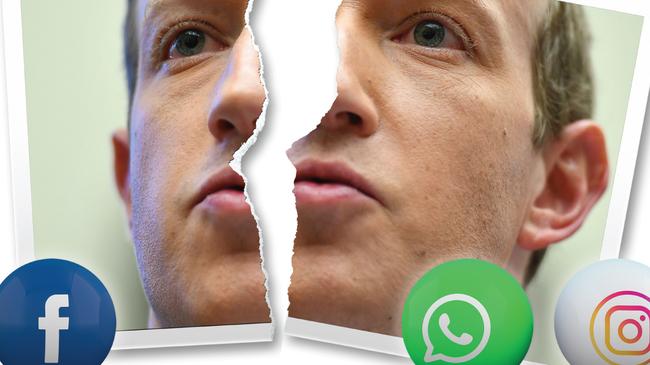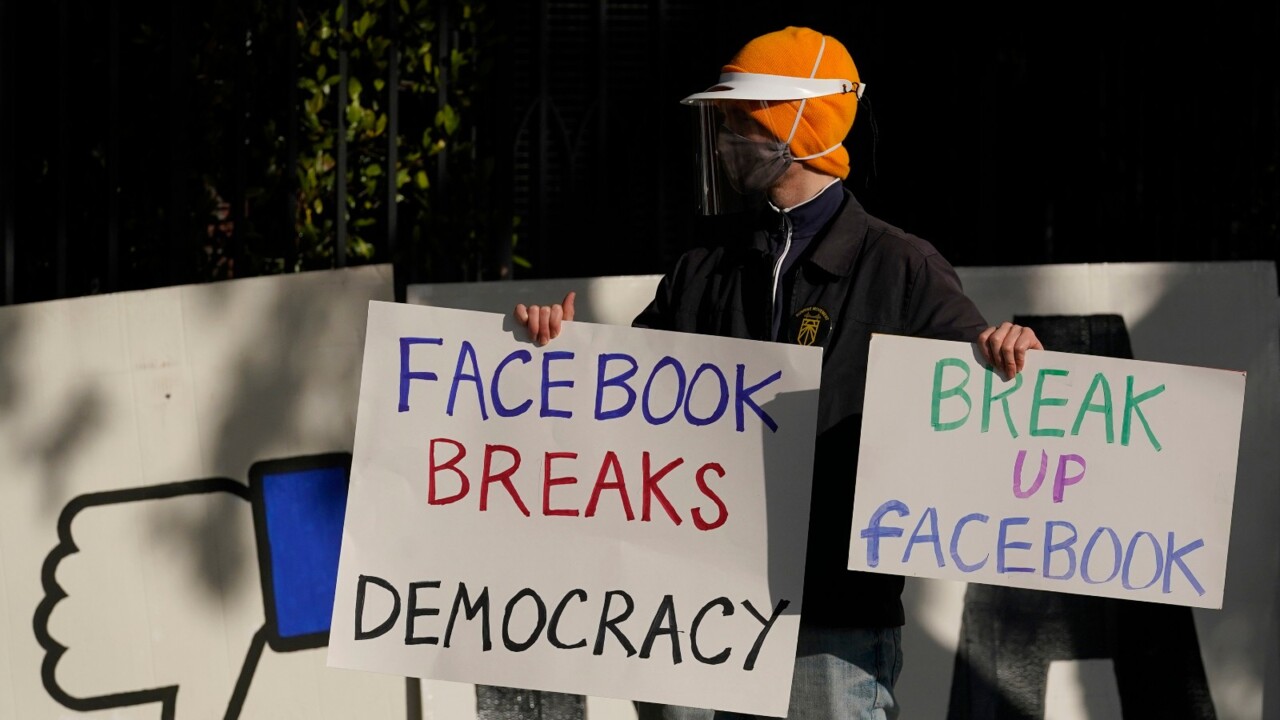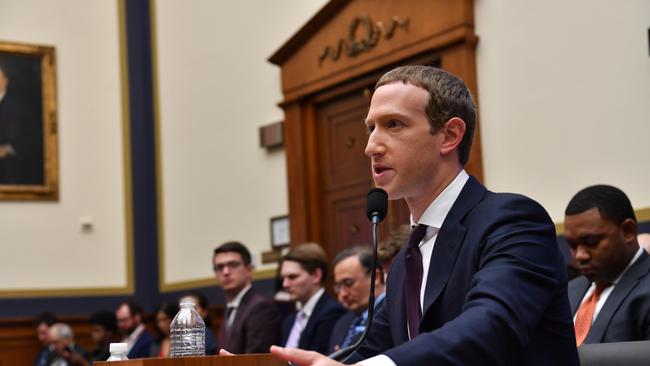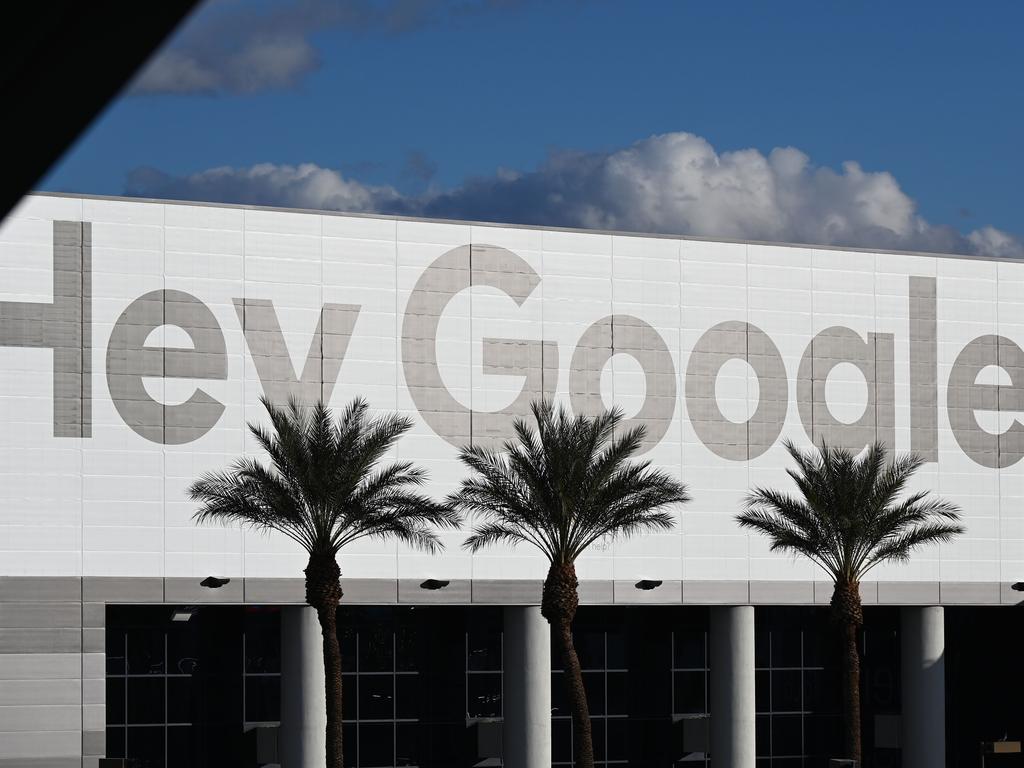‘Buy or bury’: Facebook facing up to one big split

The extraordinary lawsuit filed by 46 US states against Facebook starts with beguiling innocence, noting that every day more than half of the US population aged over 13 turns to the digital giant to keep them in touch with friends, family and organisations.
After three short paragraphs, however, the 75-page document bares its fangs.
“For almost a decade, Facebook has had monopoly power in the personal social networking market in the US,” it says.
“As set forth in detail below, Facebook illegally maintains that monopoly power by deploying a buy-or-bury strategy that thwarts competition and harms both users and advertisers.”
The buy-or-bury allegation targets Facebook’s game-changing acquisitions of photo-sharing application Instagram in 2012 for $US1bn ($1.3bn), and mobile messaging service WhatsApp in 2014 for $US19bn.
In a parallel lawsuit, the Federal Trade Commission — the US equivalent of the ACCC — rolls out the heavy artillery, seeking the forced sale of both companies.
Unsurprisingly, ACCC chairman Rod Sims has a deep interest in the Facebook pile-on.
It’s quite separate from the issues which led to recent legislation from the Morrison government designed to force Facebook and Google to negotiate with media companies over use of their content.
However, there’s a clear overlap with ACCC investigations into possible abuse of market power by Facebook in its $US400m purchase of Giphy, a search engine database for animated images known as GIFs, and its $US1bn purchase of Kustomer, a customer relationship management start-up.
Google is also under scrutiny for its $US2.1bn acquisition of wearables company Fitbit.

Sims says the ACCC is in very close contact with all its international counterparts, and the legal action against Facebook is “clearly a major development with potentially profound implications”.
“We’re going to watch this extremely closely,” he says.
“We’re also very interested in the whole idea of domestic players acquiring potential competitors –—it’s a fascinating case in that context too.”
Make no mistake about it, an antitrust case of this scale is an existential threat to Facebook and its founder Mark Zuckerberg.
Since its birth in a college dorm 16 years ago, the social media giant and other platforms have enjoyed a relatively unimpeded run, as regulators have slowly come to grips with a business model that started out as free and fun but evolved into something more concerning.
The free and fun part is still there — Facebook remains free to use. However, users pay in-kind by exchanging their time, attention and personal data.
Facebook monetises these intangibles by selling ads to firms which attach enormous value to the engagement and highly targeted advertising opportunities.
As the states say in their lawsuit, the more data Facebook accumulates by “surveilling” the activities of its users, and the more time the company convinces users to spend engaging with Facebook services, the more money the company makes through its advertising business.
It’s a network effect on steroids, now that the number of worldwide users has mushroomed to more than 2.5 billion.
Zuckerberg is not going to surrender his empire without a fight.
Facebook vice president and general counsel Jennifer Newstead launched a spirited, preliminary defence on the group’s website, saying the most successful platforms mature and adapt to people’s changing preferences.
“Our products became and remain popular for this very reason — we constantly evolve, innovate and invest in better experiences for people against world-class competitors like Apple, Google, Twitter, Snap, Amazon, TikTok and Microsoft,” Newstead said.
On the lawsuits, she fired back, noting that the FTC previously approved the Instagram and WhatsApp acquisitions.
“Now, many years later, with seemingly no regard for settled law or the consequences to innovation and investment, the agency is saying it got it wrong and wants a do-over,” she said.
“No American antitrust enforcer has ever brought a case like this before, and for good reason.”
Newstead is right in saying that the Instagram and WhatsApp deals sailed through regulatory scrutiny.

What she didn’t mention, though, was the internal Facebook communications since brought to light in the US by the House Judiciary Committee antitrust panel. Some of those exchanges made the cut into the lawsuit by the states.
In 2012, before the Instagram purchase, Zuckerberg wrote about his concern that Facebook Blue was already “very behind” Instagram “in both functionality and brand on how one of the core use cases of Facebook will evolve in the mobile world.”
He said being so far behind was “really scary”, and a reason that Facebook “might want to consider paying a lot of money” for Instagram.
When a Facebook executive asked if one of Zuckerberg’s goals in trying to purchase Instagram was to “neutralise a potential competitor,” he agreed that it was.
One of the big challenges for regulators in bringing home huge antitrust cases against powerful companies with unlimited resources is to somehow get hold of “smoking gun” documents.
Facebook will see the FTC’s 3-2 split in favour of taking legal action as grounds for optimism, but it depends on which way you look at it. The fact that only two of the officials are Democrats, which means a Republican was part of the majority, could also be seen as a negative.






